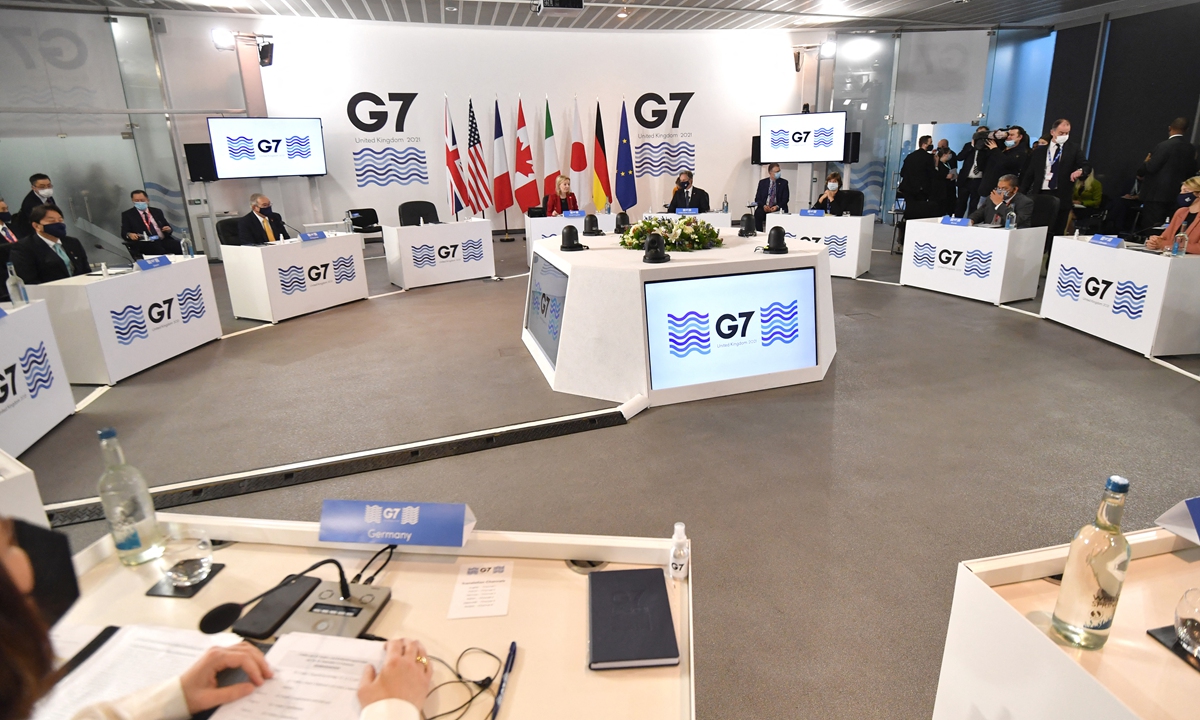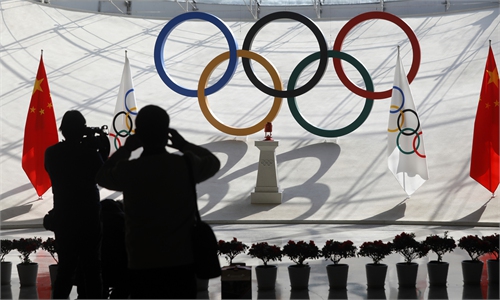Tokyo struggles on Beijing Winter Olympics decision amid strong desire for Biden-Kishida meeting

The UK's Foreign Secretary Liz Truss speaks during a G7 Foreign and Development Ministers Session with Guest Countries and ASEAN Nations on December 12, 2021 in Liverpool, England. Photo: VCG
Japan again chose to keep silent at the ongoing Group of Seven (G7) summit on the US' calling on its allies not to send diplomatic representatives to the Beijing Winter Olympic Games, which experts said demonstrates that Japan is in a dilemma, as on one hand, China fully supported it in holding the 2020 Olympics, but on the other hand, the Japanese government worries that any positive gesture to China at this time would affect a potential meeting between their new prime minister and Biden.
Foreign ministers of the G7 nations on Saturday each put forward their positions on the Beijing 2022 Olympics, a Japanese delegation source was quoted as saying in a report by the Mainichi Newspaper, as the US takes the lead in announcing not sending diplomats to the event.
Speaking on the first day of the two-day meeting, Japanese Foreign Minister Yoshimasa Hayashi said that Tokyo will make a decision at an appropriate time after comprehensively taking into account various issues, according to the source, the Mainichi Newspaper.
Japanese Prime Minister Fumio Kishida made similar remarks on Thursday in Tokyo. "I will make a judgment by myself at an appropriate time after comprehensively taking into account various issues in consideration of national interest," Kishida said.
The Kishida government is in a dilemma over whether to send officials to Beijing Winter Olympic Games 2022, observers said. Japan should show good faith in return after China gave its full support to the Tokyo 2020 Olympic Games and 2022 will mark the 50th anniversary of the normalization of diplomatic relations between China and Japan, but it is being forced to pick sides as the US launched the so-called "diplomatic boycott" and coerced its allies to follow suit, observers explained.
Da Zhigang, director and research fellow of the Institute of Northeast Asian Studies at Heilongjiang Provincial Academy of Social Sciences and chief expert at the Northeast Asian Strategic Studies Institute, told the Global Times on Sunday that he believes Tokyo is unlikely to send Cabinet members or even lower-profile officials to the Beijing Winter Olympics given domestic pressure, especially from the conservatives of the ruling Liberal Democratic Party (LDP) and the negative signals at the G7 meeting.
Citing Japanese media which revealed that Tokyo is considering sending lower-level officials to the Games instead, with Koji Murofushi, director-general of the Sports Agency, and Yasuhiro Yamashita, president of the Japanese Olympic Committee, proposed as potential delegates, Da said the proposal met a backlash from the LDP after strong conservative forces in the party have pushed the Kishida government to voice support for the "diplomatic boycott" in a timely manner.
"For Kishida, Tokyo 2020 chief Seiko Hashimoto would be the better delegate to attend the Games instead," Da believes.
After taking office in October, Kishida has been eager to visit the US to meet US President Joe Biden as soon as possible, Da said, noting that to this end, Tokyo is flattering Washington.
However, Washington is allegedly not satisfied with Kishida who appointed Hayashi as Japanese foreign minister because Hayashi was seen as holding a "pro-China" stance, Da said. To shake off this "pro-China" label, Hayashi made provocative remarks at the G7 meeting over China's so-called human rights issues and the Taiwan question, which can be seen as one of the efforts by the Japanese government to please Washington, Da noted.
Not only Japan, G7 members Germany and Italy have yet to officially announce their decision on whether to join the US' political campaign. France defied the US' calls on Thursday. Only the UK and Canada among G7 followed the US. Experts said this reflects an internal split over the issue.
Li Haidong, professor at the Institute of International Relations of the China Foreign Affairs University, believes these two European countries are more likely to show diplomatic independence and would not just follow the US on the issue.
While slamming Washington which weaponized and politicized the sports event in an attempt to attack China, Li said the two European countries would decide after taking into account their national interests and relations with China.
The split in opinions over the Beijing 2022 issue among G7 nations again reflects that the West is divided and the US no longer has the power to gain a mass and united response in the West, which is a doomed result for the superpower, Li noted.



